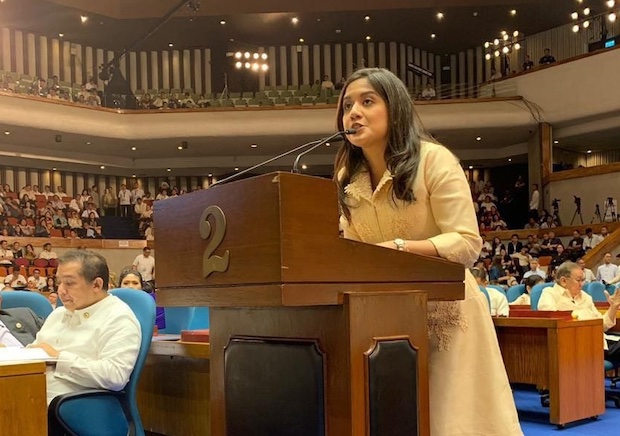
Las Piñas Rep. Camille A. Villar (File photo from her Facebook page)
MANILA, Philippines — Las Piñas Rep. Camille Villar wants the government to check on the mental health of students and do a comprehensive study on the issue.
Villar made the call through House Resolution No. 900 which she authored and filed last March 30. It highlighted the rise in suicide and self-harm incidents among young people.
Villar cited data from the Department of Education (DepEd) stating that more than 400 students took their own lives in 2021 and 2022.
“There is a need to conduct an in-depth assessment of and comprehensive study by relevant government agencies — such as the Department of Health, [DepEd], and the Philippine Statistics Authority — on the present state of mental health of the country’s education sector in particular and the overall population in general to address immediate needs in a bid to establish more mental health units in schools, hospitals, or rural health units, among other measures,” Villar said in a statement on Tuesday.
“[There is also an] urgent need to have a proactive effort to promote their mental health and well-being and prevent mental health disorders and improve the overall mental health access and therapist services in schools and communities to address the apparent mental health crisis in the education sector,” she added.
Aside from suicides, Villar presented other numbers which show that mental health problems had become serious national issues that the country would have to contend with:
• Of the 28 million learners in public schools, 775,962 sought the assistance of guidance counselors in cases that includes about 8,000 bullying incidents.
• A 2015 World Health Organization survey showed that 11.6% of Filipino children aged 13 to 17 “seriously considered” attempting suicide 12 months before the survey. A total of 16.2% of the respondents said they attempted suicide once or more times in the same time period.
• In 2019, the numbers jumped to 23.1% of respondents who have “seriously considered” attempting suicide; while 24.3 percent of students attempted suicide “one or more times” during the 12 months before the survey.
• It is believed that 3.3% of the population — or around 3.3 million Filipinos — live with depression.
• The suicide mortality rate is 3.2 per 100,000 population.
In her resolution, Villar said the COVID-19 pandemic greatly contributed to the mental health issues faced by Filipinos due to their lack of mobility and reduced social engagements.
“There is also an urgent need to have a proactive effort to promote mental health and well-being and prevent mental health disorders and improve the overall mental health access and therapist services in schools and communities to address the apparent mental health crisis in the education sector,” Villar said.
“The collective health of citizens greatly affects the success of their overall socio-economic development, as well as their access to education and other basic services,” she added.
Mental health issues had been a concern even before face-to-face classes resumed. When the COVID-19 pandemic hit the Philippines and required stay-at-home policies, government agencies noticed a spike in calls about suicide-related concerns.